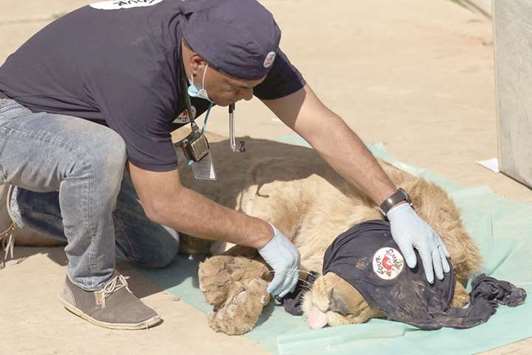In happier times, families came to admire the animals. But later, as the Syrian war dragged on, the lions, tigers, bears and hyenas became emaciated, barely surviving. Many didn’t. Shrapnel is littered around the pens. Replica ancient columns lie toppled over.
This is the Magic World theme park, on the edge of the war-ravaged city of Aleppo. Much of it was in ruins when Amir Khalil, a veterinarian, and his team arrived with transport cages and lorries.
Their mission: To rescue the last zoo animals and bring them to a safer place.
“I can’t help people. I’m a veterinarian,” Khalil says. “I believe that animals belong on our planet and that we must also help them.”
Half a year has passed since he and his team made their way to Aleppo in order to rescue the remaining animals. The creatures were brought to Turkey in a project that resembled a military operation in the amount of planning.
Some 300 animals were living in Magic World when the war in Syria broke out in 2011. There were carousels, an aquarium and exotic animals such as monkeys, lions and crocodiles.
But then Aleppo became one of the most embattled cities in Syria.
By the middle of 2017, only a few of the erstwhile several hundred animals were still alive, and 13 of them were rescued.
Khalil, who for more than 20 years has worked to free animals in all parts of the globe, recalls the pitiful condition of the animals – “emaciated and totally dehydrated.”
In the end, he and his team succeeded in transporting five lions, two tigers, two Asian black bears, two hyenas and two dogs.
The team lived in constant fear of air attacks that their very conspicuous convoy might attract. There were numerous checkpoints to pass through between Aleppo and the Turkish border.
“We spent months planning the rescue action,” Khalil says.
The various rebel groups, as well as the Syrian authorities, were informed ahead of time, and security organisations offered their help to Khalil’s animal protection organisation, called Vier Pfoten (Four Paws) based in Vienna.
“We learned that we were to be stopped along the way. And so we sent an empty convoy out and then drove a different route,” Khalil said.
The journey took three weeks before the animals could finally be brought to a safer place.
Shortly after their arrival, a lioness gave birth to a cub, which, however, died a bit later.
“On the surface, the animals are in good condition and in the meantime have settled in well,” the veterinarian says. “But just like humans, the animals are seriously traumatised.”
It only requires the sound of a helicopter overhead to send the animals scurrying for shelter.
Vier Pfoten operates worldwide, rescuing animals from war areas and operating rescue centres for abandoned animals. Shortly before its Aleppo action, the group had saved a female bear and lioness from Mosul, in northern Iraq.
“Sometimes animals can accomplish something that humans cannot,” Khalil says. “Often during war, humanity goes lost. But that so many people were involved in rescuing the animals shows that humanity is returning.”
Despite the dangers, he is now already planning his next animal rescue operation in the Middle East, this time in the Gaza Strip.
When Khalil speaks of animals, he refers to them as “ambassadors,” because they bring together many different people in their rescue operations. In a region plagued by wars, it’s a comforting thought. – DPA

CHECK UP: Veterinarian Amir Khalil examines the lion Simba in February 2017 at the zoo in the war-torn Iraqi city of Mosul.
